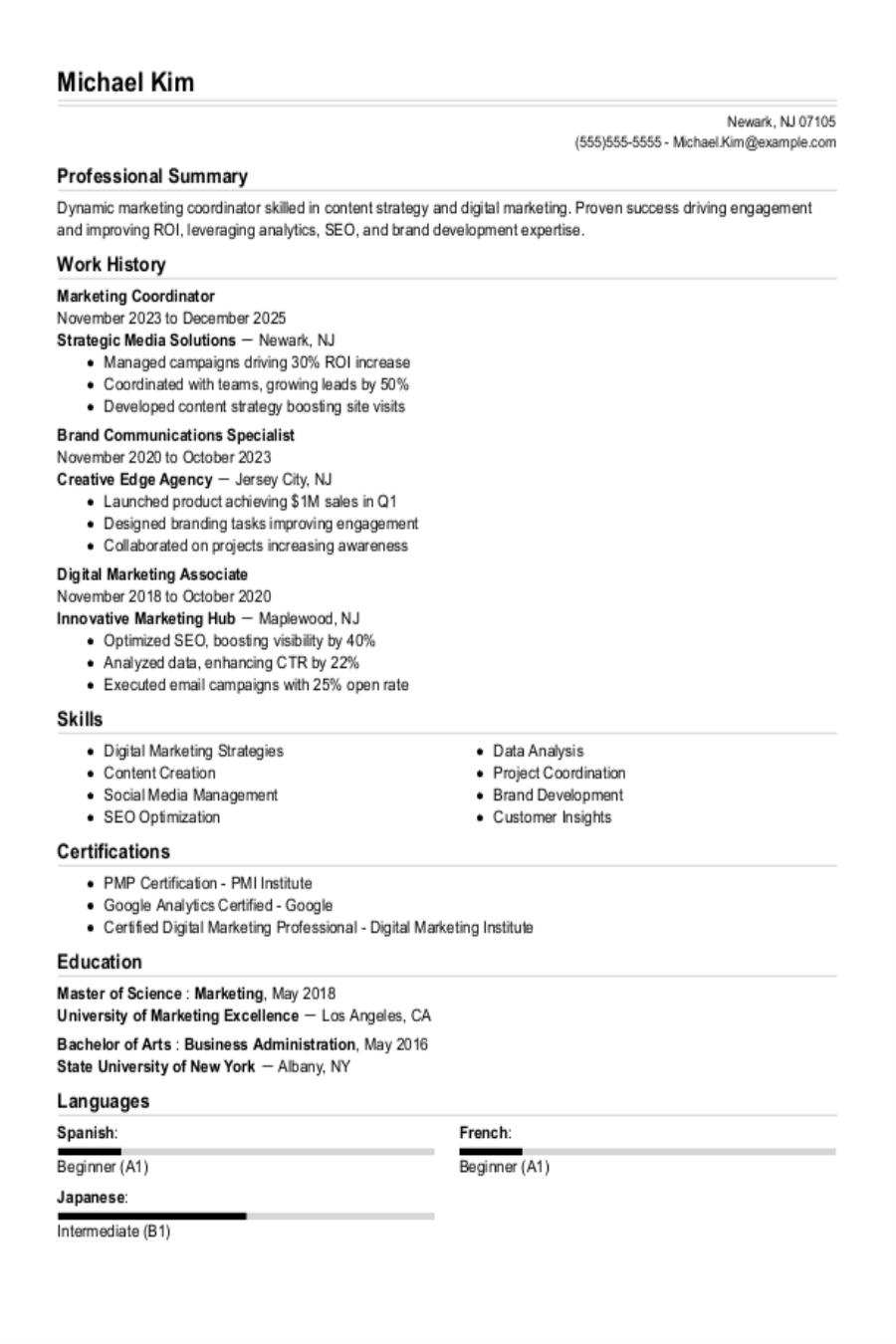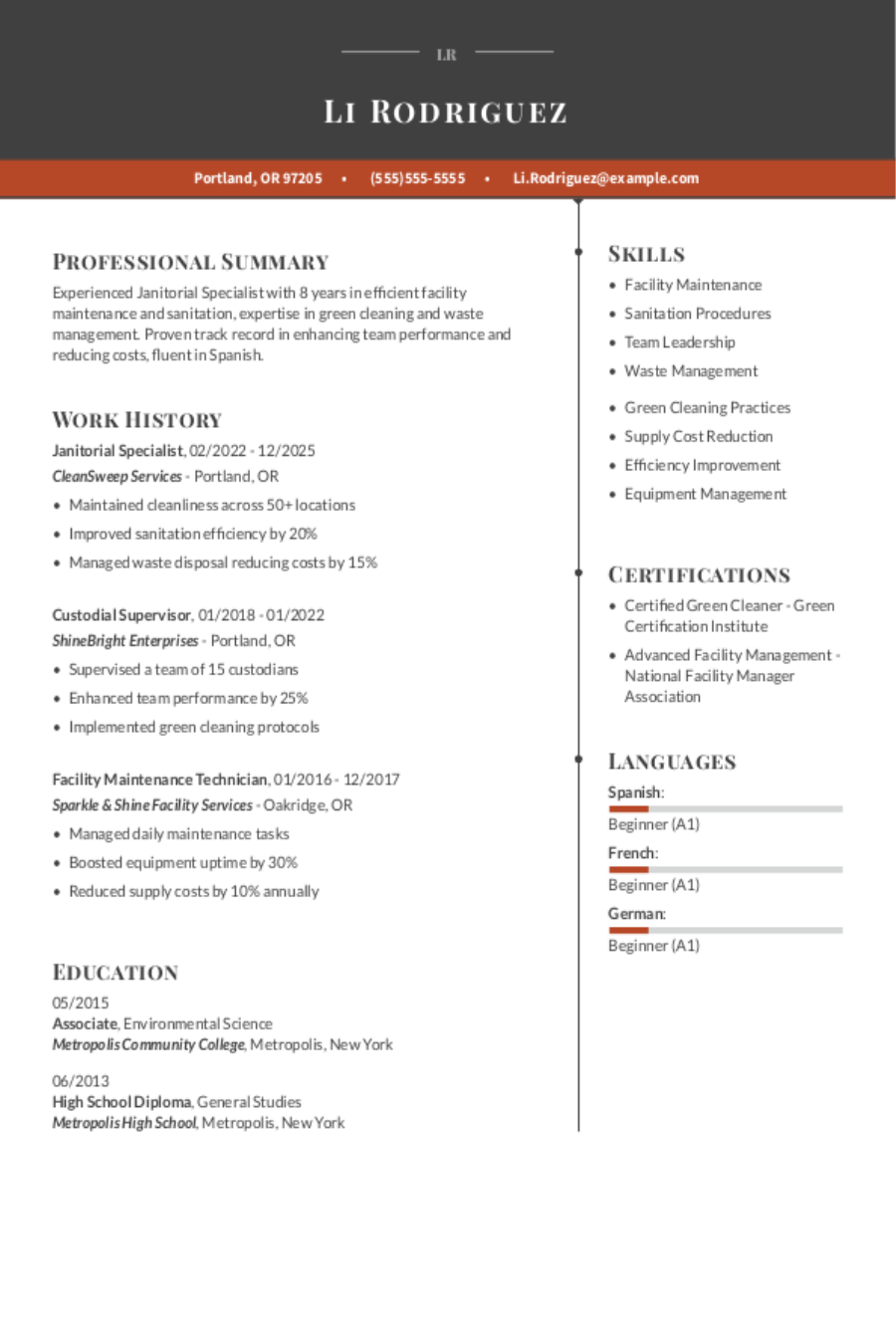Popular Warehouse Manager Resume Examples
Entry-level warehouse manager resume
An entry-level resume for a warehouse manager should highlight relevant skills, any training, leadership experiences, and familiarity with inventory management systems to demonstrate capability.
Showcases education: This resume organizes the education section near the top, allowing the candidate’s degrees to provide an early impression of expertise.
Places skills over experience: The functional resume format is strategic for this entry-level warehouse manager as it highlights skills like inventory management and team leadership, showcasing relevant achievements over less critical chronological experiences.
Mid-career warehouse manager resume
A mid-career warehouse manager resume should emphasize a combination of hands-on experience, leadership skills, and continuous improvement initiatives to effectively demonstrate career growth and operational expertise.
Balances skills and experience: This job seeker's resume effectively balances technical expertise in supply chain management with a clear career trajectory, showcasing significant achievements that demonstrate their professional growth and leadership capabilities.
Employs active language: Using action verbs such as "reduced," "implemented," and "led" effectively showcases initiative and impact, highlighting measurable achievements in warehouse management.
Experienced warehouse manager resume
An experienced warehouse manager resume should emphasize leadership achievements, operational improvements, and a clear progression of responsibilities to illustrate career growth effectively.
Highlights experience: The resume summary immediately highlights 13 years of experience in optimizing warehouse operations and process improvements, setting a professional tone by showcasing expertise in cost reduction, efficiency enhancement, and safety compliance.
Embraces modern design: This modern resume template effectively showcases the applicant's professional brand as a resourceful and results-driven warehouse manager, emphasizing their innovative strategies in optimizing operations and improving team performance.
No experience warehouse manager resume
A resume for an applicant with no experience should highlight transferable skills, relevant coursework, and any volunteer activities that showcase leadership and organizational abilities.
Overcomes lack of work history: Emphasizing my skills in logistics, inventory management, and team leadership demonstrates my readiness to excel as a warehouse manager, despite limited hands-on experience.
Avoids jargon: Job seekers might inflate basic tasks by using jargon or complex terms. Opting for a straightforward, clear approach makes responsibilities easier to understand and more effective to potential employers.
Warehouse Manager Resume Template
Kickstart your career with this comprehensive warehouse manager resume template. Simply personalize it with your details to showcase your skills and experience effectively.
Jin Lee
Parkview, MO 64161
(555)555-5555
Jin.Lee@example.com
Professional Summary
Results-driven warehouse manager with expertise in logistics, cost reduction, and team leadership, boosting productivity and accuracy with strong strategic capabilities.
Work History
Warehouse Manager
Optimal Logistics Co. - Parkview, MO
April 2023 - October 2025
- Led team to increase productivity by 25%
- Implemented a $100k cost-saving strategy
- Enhanced inventory accuracy by 15%
Logistics Supervisor
Peak Distribution Ltd. - St. Louis, MO
January 2020 - March 2023
- Managed operations cutting errors by 20%
- Reduced shipping time by 30% through automation
- Increased revenue by $500k annually
Warehouse Coordinator
Inland Transport Services - St. Louis, MO
October 2018 - December 2019
- Streamlined logistics, boosting efficiency 10%
- Assisted in reducing budget by $50k
- Trained staff improving safety compliance by 20%
Skills
- Warehouse Management
- Logistics Optimization
- Inventory Accuracy
- Budget Reduction
- Team Leadership
- Cost Saving
- Productivity Enhancement
- Safety Compliance
Education
Master's in Business Administration Supply Chain Management
University of Illinois Springfield, Illinois
May 2018
Bachelor of Science Logistics and Transportation
Southern Illinois University Carbondale, Illinois
May 2016
Certifications
- Certified Supply Chain Professional - APICS
- Lean Six Sigma Green Belt - ASQ
Languages
- Spanish - Beginner (A1)
- French - Beginner (A1)
- German - Beginner (A1)
Must-Have Skills on a Warehouse Manager Resume
A robust skills section is important for making your resume stand out in a competitive job market.
Leadership and management professionals guide teams, shape strategy, and drive results. The skills you highlight should reflect your ability to align people and priorities and move goals forward. The aim of your resume is to show how your leadership skills contribute to long-term growth and organizational success.
The following data highlights the most sought-after hard and soft skills for warehouse managers based on insights from Resume Now’s internal resume data.
When you’re ready to improve your resume, check out our AI Resume Skills Generator. It provides tailored suggestions for both hard and soft skills related to your job title, ensuring you create a comprehensive skill set.
Writing Your Warehouse Manager Resume
With a solid understanding of the best resume examples, you're now prepared to dive into how to write a resume. We'll take you through the writing process step by step, exploring each section along the way.
List your most relevant skills
An effective skills section for your warehouse manager resume should clearly showcase abilities like inventory management, team leadership, and safety compliance. Incorporating keywords from the job listing is important as it helps you align with the specific requirements employers are looking for. This not only speaks to human recruiters but also improves your visibility in applicant tracking systems.
When building this section, pay attention to the job description and include terms such as logistics coordination and problem-solving. By using these relevant keywords, you demonstrate that you possess the qualifications needed for a warehouse manager.
Example of skills on a warehouse manager resume
- Proficient in managing inventory systems and ensuring accurate stock levels
- Capable of leading a diverse team to achieve operational goals
- Strong analytical skills for optimizing warehouse processes
- Excellent communication abilities for effective collaboration across departments
Highlighting your soft skills on your resume can set you apart from other job seekers. Employers greatly appreciate interpersonal abilities, as they are often challenging to develop and play an important role in team dynamics and workplace success.
Highlight your work history
Your work experience section should focus on showcasing your achievements and demonstrating how you applied key skills in a fast-paced environment. By highlighting specific accomplishments that reflect your capabilities and resonate with potential employers, using industry-related keywords becomes essential.
Be sure to include important details for each job entry, such as your title, the name of the employer, and the dates you were employed. Including this information helps establish your credibility and provides a clear timeline of your professional journey. Additionally, quantifying your achievements whenever possible will illustrate the impact you made in previous roles.
Example of a warehouse manager work experience entry
- Warehouse Manager
ABC Logistics - Dallas, TX
June 2019 - Present - Oversee daily warehouse operations, ensuring efficient processes that led to a 15% increase in overall productivity
- Implement inventory management systems that reduced stock discrepancies by 30%, improving accuracy and reliability
- Lead a team of 20+ employees, providing training and development that improved performance ratings by 25%
- Collaborate with cross-functional teams to optimize logistics solutions, decreasing shipping costs by 10% while maintaining delivery timelines
- Maintain compliance with safety regulations and company policies, achieving a zero-accident record for two consecutive years
Aim for clarity in your resume bullet points. Use specific metrics or outcomes to demonstrate your achievements without excessive detail. This approach ensures you convey valuable information succinctly and effectively.
Include your education
The education section of your warehouse manager resume should list your academic credentials in reverse-chronological order starting with the most recent degree. Include relevant diplomas and certifications while omitting your high school diploma if you have a higher-level qualification.
If you are currently pursuing a degree or have incomplete education, indicate your highest completed level along with an expected graduation date. You can also include bullet points to outline important coursework or specific skills acquired during your studies. This is particularly useful for current students or recent graduates to showcase their educational background effectively.
Common certifications for a warehouse manager resume
- Certified Warehouse Logistics Professional (CWLP) – American Society of Transportation and Logistics
- Certified Supply Chain Professional (CSCP) – Association for Supply Chain Management
- Warehouse Management Professional (WMP) – International Warehouse Logistics Association
- Lean Six Sigma Green Belt (LSSGB) – ASQ - The Global Voice of Quality
Sum up your resume with an introduction
Your resume profile is your first chance to make a lasting impression as a warehouse manager. This concise section sets the tone for the rest of your resume, summarizing who you are professionally and what you bring to the table.
If you are an experienced warehouse manager, employing a professional summary allows you to showcase your significant achievements and career milestones right at the top. This approach puts your most impressive qualifications front and center, enabling recruiters to quickly gauge your suitability for the role based on past successes and leadership abilities.
If you have little experience, create a resume objective centered on your professional development goals.
Professional summary example
Results-driven warehouse manager with over 10 years of experience optimizing logistics and supply chain operations. Demonstrated success in leading diverse teams, improving inventory accuracy, and reducing operational costs through effective process improvements. Highly adept at implementing safety protocols and managing complex warehouse systems to ensure seamless product flow.
Resume objective example
Enthusiastic warehouse manager eager to leverage strong organizational skills and attention to detail to improve operational efficiency within a fast-paced environment. Committed to using problem-solving abilities and teamwork to ensure timely order fulfillment and maintain high standards of inventory management.
When crafting your resume profile, start with your job title as a warehouse manager. This approach instantly communicates your professional identity and helps employers understand who you are and what you bring to the table.
Add unique sections to set you apart
Including optional resume sections can improve your application by highlighting your unique qualifications as a warehouse manager. These sections allow you to showcase your diverse experiences and skills that set you apart from other job seekers.
Think about incorporating details about relevant hobbies or volunteer work. For instance, if you've organized community events or participated in team-building activities, these experiences can reflect your leadership abilities and commitment to teamwork. By sharing these aspects of your professional life, you give employers a better understanding of who you are as a applicant and how you align with their values and goals.
Three sections perfect for a warehouse manager resume
- Languages: As a warehouse manager, effective communication is important for coordinating with diverse teams. Highlighting your language skills on your resume can improve collaboration and improve operational efficiency.
- Volunteer Work: Including volunteer work on a resume can improve your professional skills and highlight your dedication to community service. This experience showcases your ability to collaborate and lead, making you a more appealing applicant to potential employers.
- Accomplishments: As a warehouse manager, quantifiable accomplishments are vital for illustrating your impact on operations. Present these achievements within your work experience section or consider adding a distinct accomplishments section to emphasize them.
5 Resume Formatting Tips
- Choose a format that matches your career stage.
Choosing the right resume format is important for showcasing your experience effectively. If you're a seasoned warehouse manager, a chronological format highlights your career progression. For those new to the field, consider a functional resume to emphasize relevant skills. A combination format can also work well, balancing both experience and skills to make you stand out.
- Pick a smart resume template.
Using a professional resume template improves the readability of your application. A well-structured format allows hiring managers to quickly grasp your experience and skills. If you choose to create your own layout, prioritize clarity by using clean designs and ATS-friendly fonts for optimal viewing.
- Select an appropriate font.
Use a clean, professional font like Arial, Helvetica, or Georgia to improve your resume's readability and ensure clarity for both ATS and hiring managers.
- Use consistent formatting.
Ensure your resume has uniform margins and is left-aligned. This approach improves readability and presents a polished, professional look to potential employers.
- Keep your resume to one or two pages.
When crafting your resume, it's important to remember that resumes should be one page long in most cases. Focus on including only the essential details that highlight your skills and experience to keep it concise and compelling.
Tools for Your Job Search
Are you preparing to apply for that warehouse manager position you've been eyeing? Before you submit your application, take advantage of our ATS Resume Checker. This tool analyzes how well your resume aligns with the criteria set by automated systems many companies use during their initial screening process.
To refine your application further, explore our AI Resume Builder. It offers tailored suggestions specific to your experience in warehouse management and includes professional templates designed to highlight your skills and achievements effectively for hiring managers.
Frequently Asked Questions
Last Updated: October 23, 2025
Absolutely. A cover letter is important as it adds depth to your resume and allows you to communicate more personally with employers. It’s your opportunity to convey your enthusiasm for the warehouse manager role and showcase how your experience makes you an ideal applicant. So, don’t hesitate—write a cover letter that highlights your strengths.
To simplify this process, consider using our AI Cover Letter Generator, which can help you quickly create a personalized cover letter in just minutes. Plus, you’ll have access to various cover letter template options that perfectly match your resume, making it easy to present a cohesive application package.
A CV (curriculum vitae) is generally more extensive and detailed than a resume. Resumes are typically concise, spanning one to two pages, while CVs can extend several pages, offering in-depth insights into your academic background, research achievements, and professional experiences.
For positions in academia or specialized fields like law and medicine, you'll want to use a CV. If you're unsure whether to create a CV or resume, our online CV Maker can assist you in crafting a tailored document quickly. Choose from various CV templates designed for different industries and career levels to get started effortlessly.
To make your warehouse manager resume stand out, select a polished, professional template and integrate specific keywords from the job description. This strategy will improve your visibility to potential employers.
To develop a strong skills section as a warehouse manager, integrate both technical proficiencies, such as inventory management systems and safety protocols, with vital soft skills like leadership and communication. In your experience section, illustrate how you applied these skills to optimize operations and improve team productivity.
Practice job interview questions and answers to boost your confidence. This preparation helps you tackle surprises with ease.
In your resume profile, you might describe yourself as "warehouse manager aiming to improve logistics skills." However, for a deeper impact, elaborate on your ambitions in your cover letter. Highlight how specific roles can foster your growth and showcase your desire to take on challenges that align with your career path.
Was this information helpful? Let us know!
Hailey is a career advice writer dedicated to helping job seekers excel in their careers.
More resources

Summary of Qualifications: 13 Examples for Your Resume
Our guide will help you write a summary of qualifications that...

How to Write a Cover Letter in 2025
A great cover letter will impress employers and get you hired....

Cost of Living Crunch: 92% of Americans Cut Back Spending in 2025
Resume Now s survey reveals a cost of living crisis that has l...

Advertising Resume: Examples & Templates
As an advertising professional you need a resume that capture...

Marketing Coordinator Resume: Examples & Templates
As a marketing coordinator you need a resume that highlights ...

Janitorial Resume: Examples & Templates
As a janitorial professional you need a resume that highlight...

